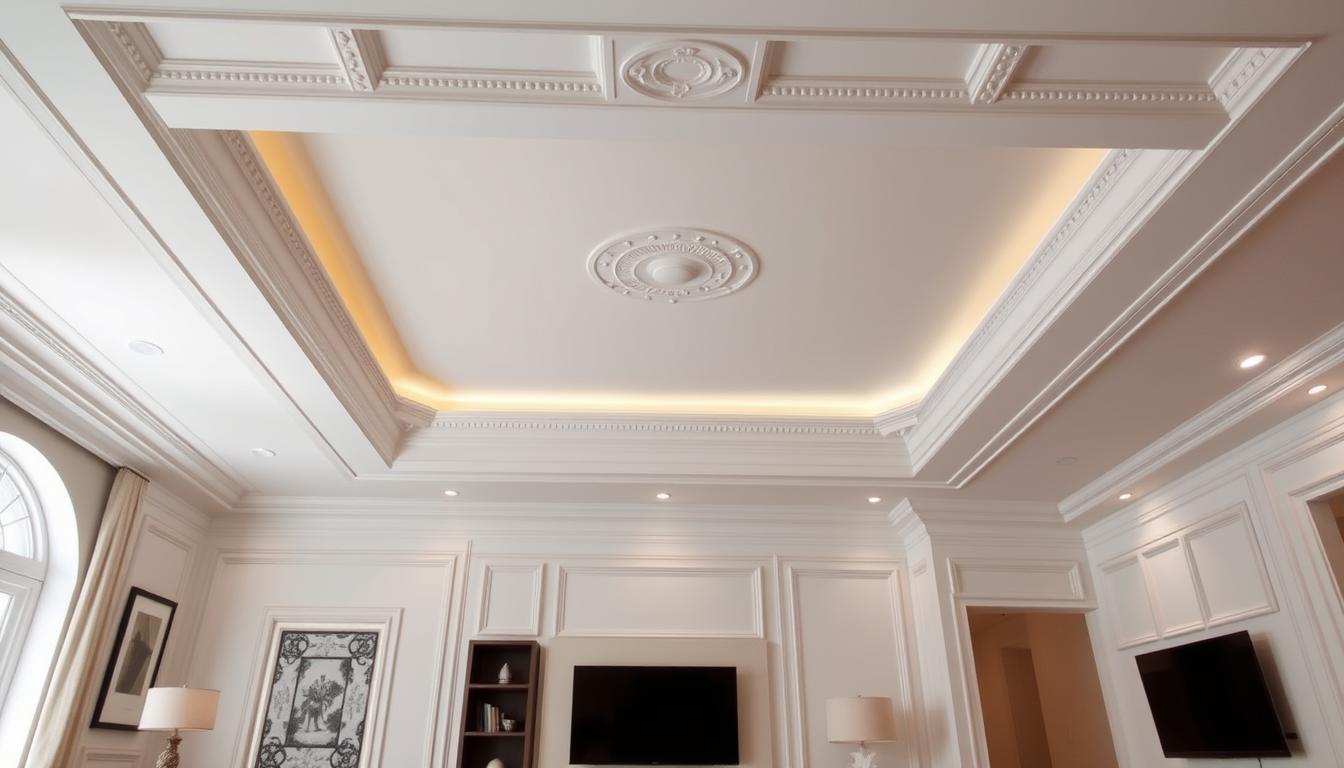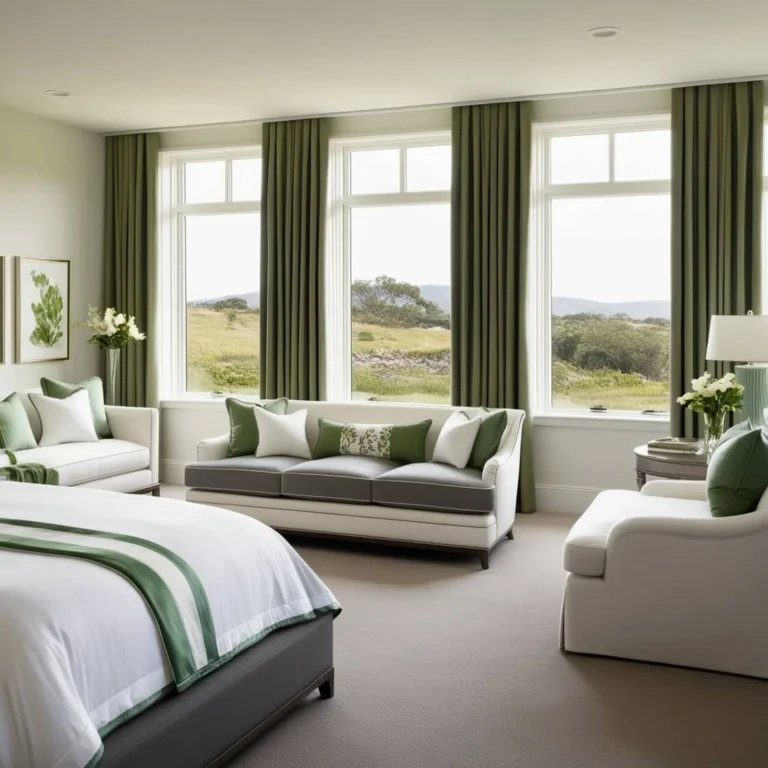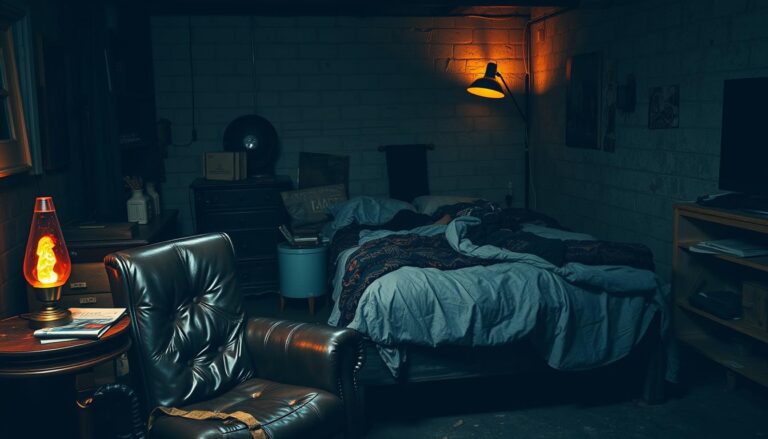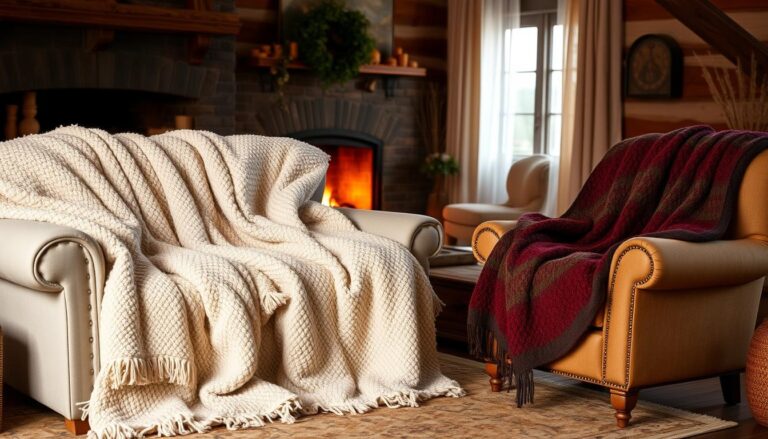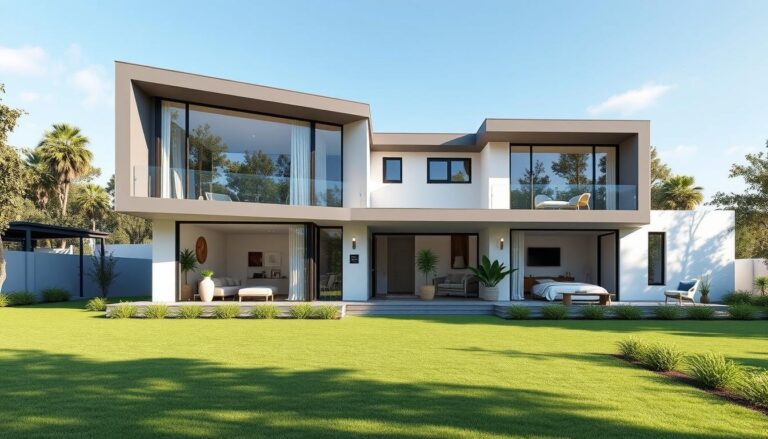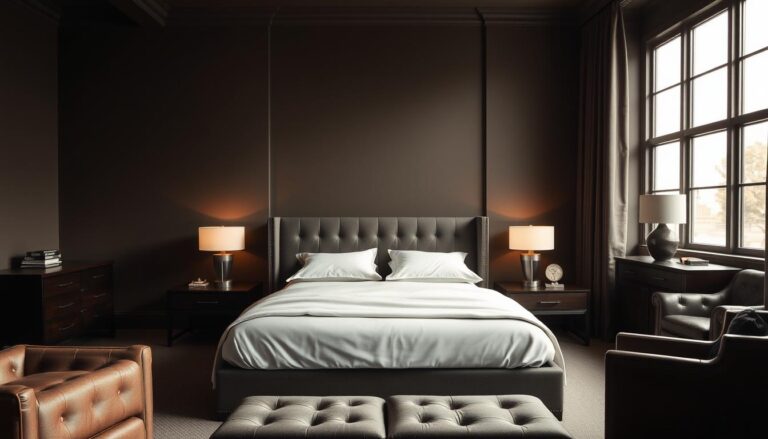Tray Ceiling: Design Ideas and Inspiration
A tray ceiling can really change how your home looks. It makes rooms feel taller and more open. You can pick from many styles, from modern to traditional, to match your taste.
Tray ceilings add interest to any room. They can be the main attraction. You can choose a design that fits your style, whether it’s modern or classic.
With a tray ceiling, you can try out new lighting, colors, and finishes. This lets you create a unique look. We’ll explore tray ceilings further, including design ideas and how to make your space special.
Key Takeaways
- You can create a sense of height and openness with a tray ceiling
- Tray ceiling design ideas are versatile and suitable for various tastes and decor
- A tray ceiling can add a touch of elegance to your space
- You can experiment with different lighting solutions and paint colors with a tray ceiling
- Tray ceilings can be designed to suit modern or traditional styles
- A tray ceiling can become the focal point of your room with the right design
What Is a Tray Ceiling and Its Key Features
When you think about renovating or designing your space, knowing about tray ceilings is key. A tray ceiling, also called a recessed ceiling, has a central recessed panel. It adds depth and interest to a room, making it look like ceilings are higher. It’s also great for placing lighting fixtures.
Tray ceilings and coffered ceilings are different. Tray ceilings are simple and versatile. Coffered ceilings have a more detailed design with several recessed panels. Tray ceilings are easy to install and maintain, making them popular among homeowners.
Definition and Basic Structure
A tray ceiling has a flat ceiling with a recessed section, usually in the room’s center. This recessed area can be decorated with molding, trim, or lighting to improve the room’s look.
Historical Background
Tray ceilings have been used in many architectural styles over time. They were used to add grandeur and elegance to formal rooms like dining and living rooms.
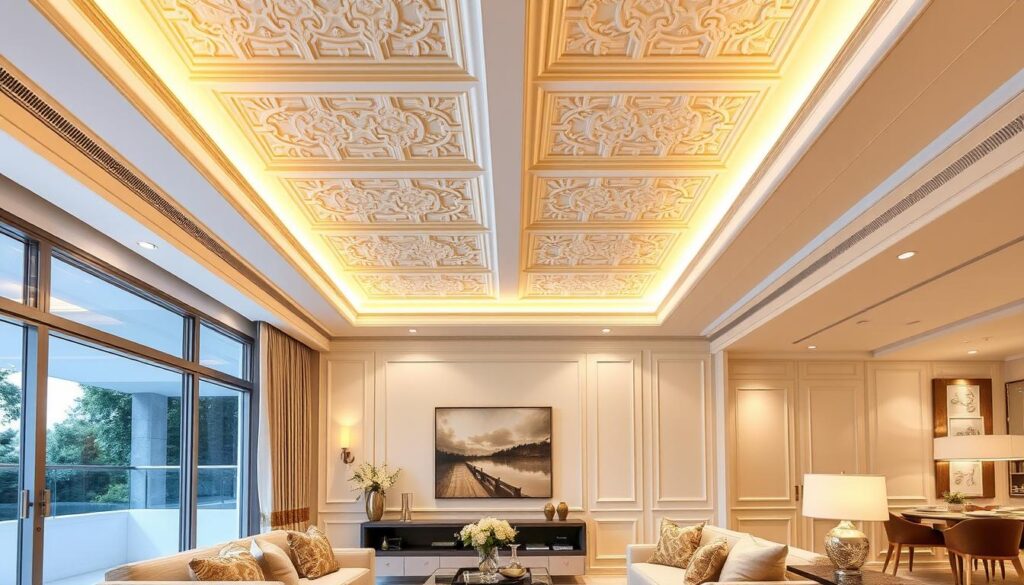
Common Architectural Applications
Tray ceilings fit into various rooms and styles, including modern, traditional, and minimalist. They work well with crown molding and wainscoting to create a polished look.
Benefits of Installing a Tray Ceiling
Thinking about a tray ceiling? It’s all about the look it brings to your space. Tray ceilings make rooms feel taller and more open. This is great for small spaces, where regular ceilings can feel too close.
Tray ceilings also boost your room’s lighting. They create a recessed area perfect for downlighting. This adds warmth and coziness, perfect for living areas.
Some key benefits of tray ceilings include:
- Creating a sense of spaciousness
- Enhancing aesthetic appeal
- Improving lighting
- Providing a unique design element
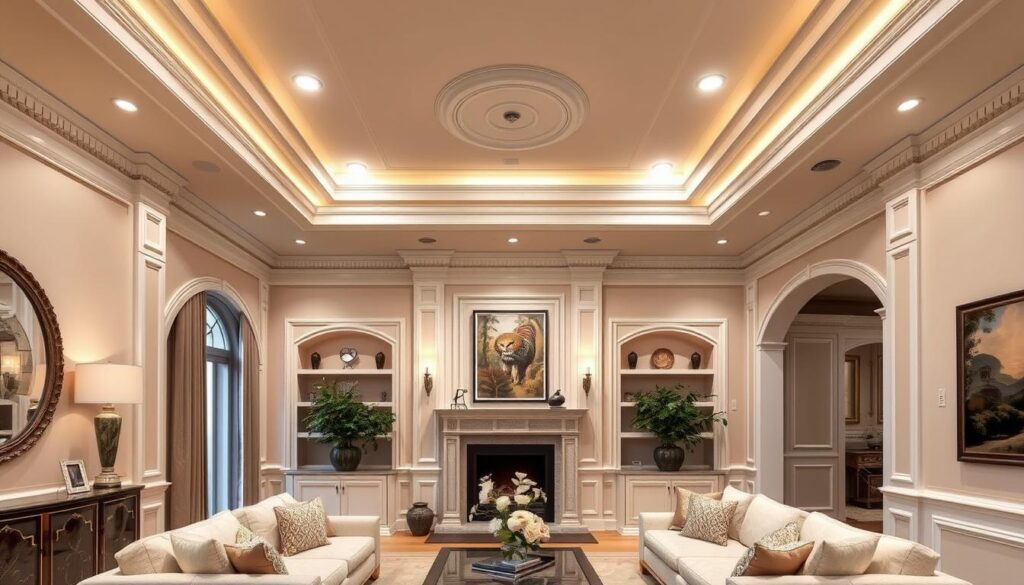
Tray ceilings can also tie different areas together in open-plan spaces. They add visual interest and depth. With the right design, a tray ceiling can greatly enhance your home’s look and function.
| Tray Ceiling Benefits | Description |
|---|---|
| Increased Sense of Space | Creates a sense of height and openness, making the room feel larger |
| Improved Lighting | Allows for recessed lighting, creating a warm and cozy atmosphere |
| Unique Design Element | Adds visual interest and creates a sense of depth in the room |
Creative Tray Ceiling Design Variations
Tray ceiling designs offer endless options. You can pick styles that match your taste and decor. For a modern vibe, go for sleek lines and minimalism. This creates a room that feels open and airy.
If you like a classic look, choose traditional patterns for elegance. Geometric designs, like chevrons and hexagons, add a unique touch. They make your room stand out.
Contemporary Styles
Contemporary designs have clean lines and simple shapes. They use a few colors to keep things calm. Adding textures, like wood or metal, can make it more interesting.
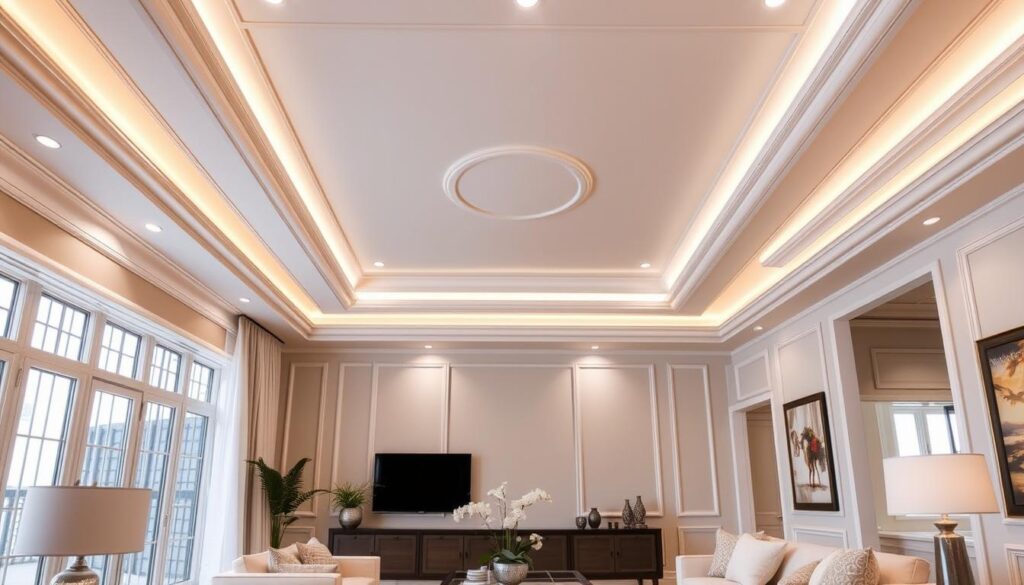
Traditional Patterns
Traditional designs are all about intricate patterns and details. They bring luxury and sophistication to a room. You can pick from floral motifs, acanthus leaves, and scrollwork.
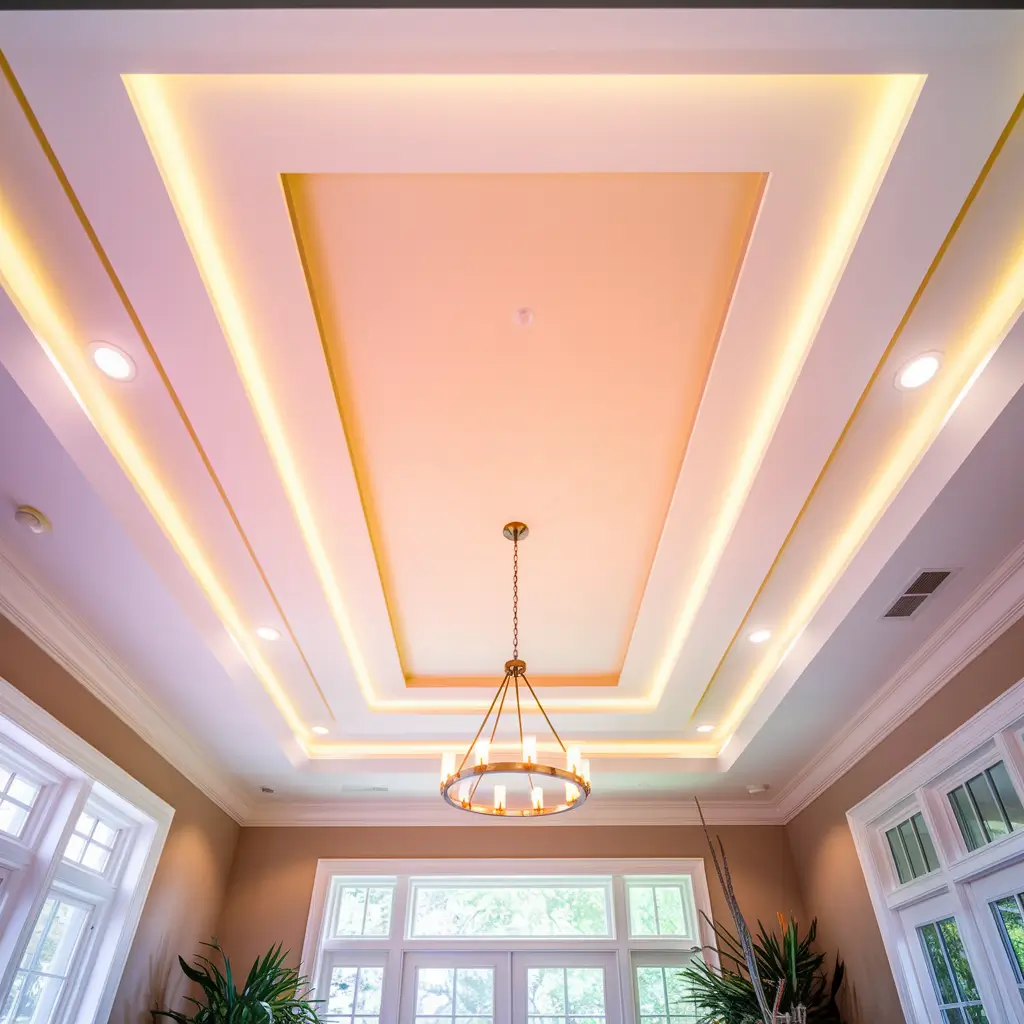
Other ideas include:
-
Geometric designs, such as chevrons and herringbone
-
Minimalist approaches, like a simple white or gray tray ceiling
- Modern tray ceiling design, for a sleek look
Essential Lighting Solutions for Your Tray Ceiling
Lighting is key to making a tray ceiling look great. LED strips along the edges can create a modern look. This is a popular choice for tray ceiling lighting.
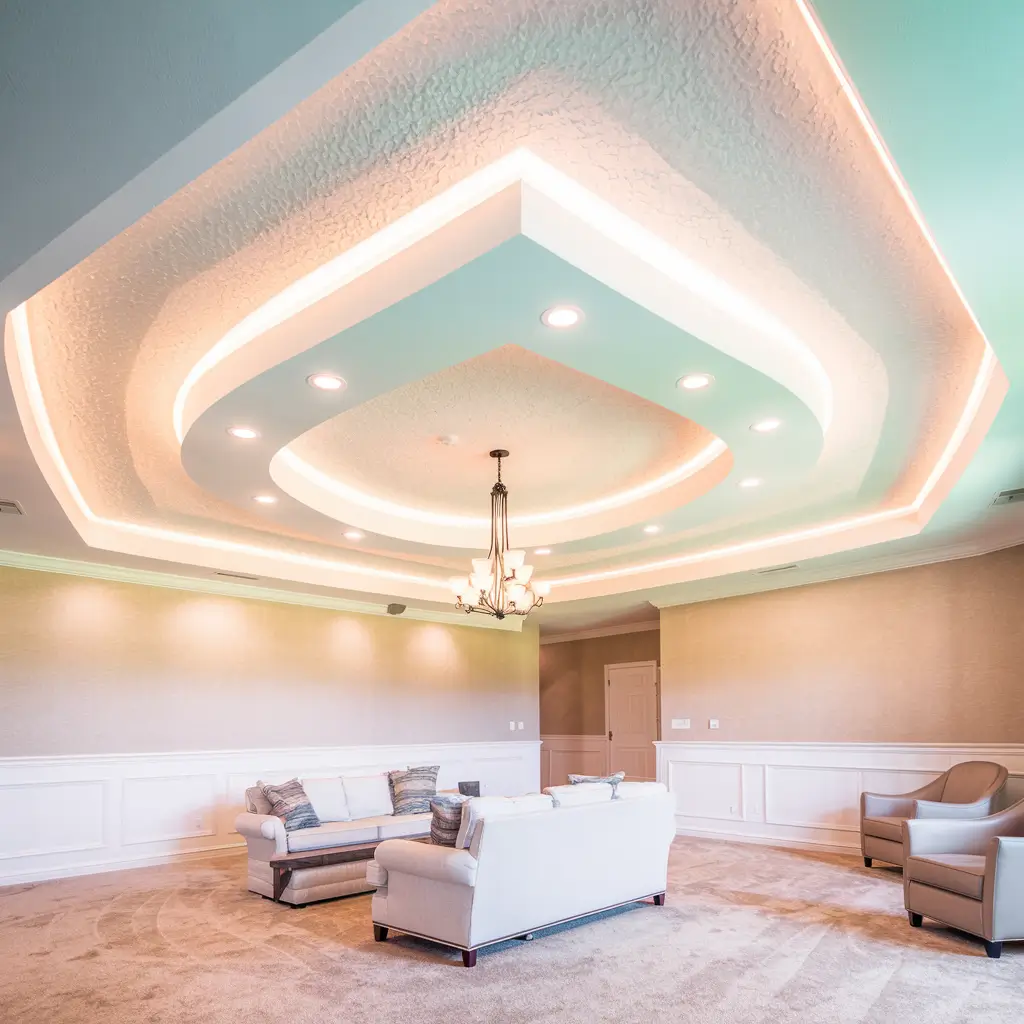
Recessed lighting can highlight the ceiling’s design. It adds depth to your space. Chandeliers or pendants can also bring elegance to your room. Here are some tips:
- Choose the right lighting fixtures that complement your tray ceiling design
- Consider the size and scale of the fixtures in relation to the ceiling
- Think about the color temperature and brightness of the light to create the desired ambiance
By picking the right lighting, you can make your space beautiful and functional. Make sure your lighting fits with your room’s look. This will create a welcoming atmosphere.
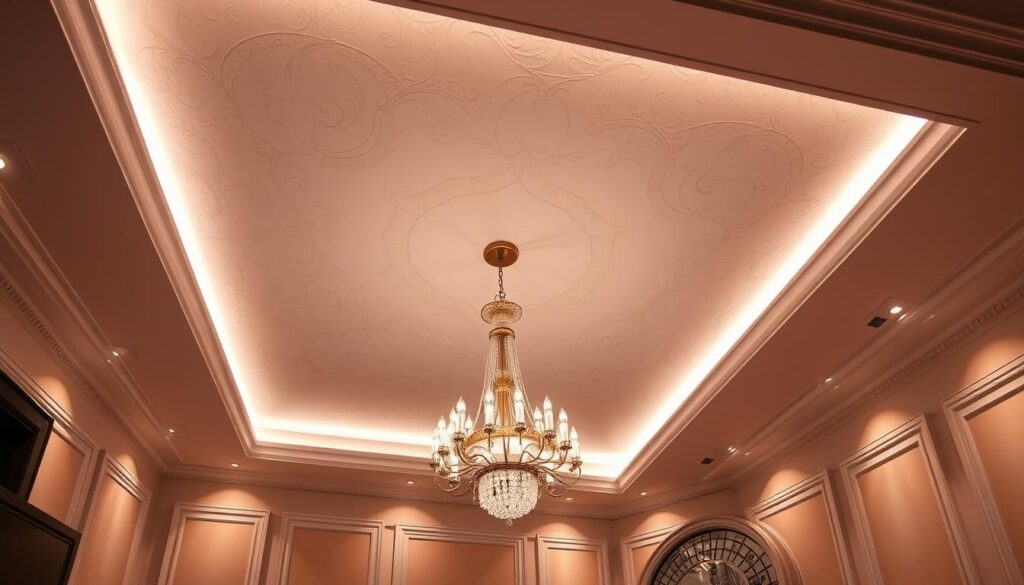
These lighting solutions can turn your tray ceiling into a stunning feature. Whether you like modern or traditional, there’s a lighting option for you.
| Lighting Option | Description |
|---|---|
| LED Strips | Energy-efficient and versatile, perfect for creating a modern glow |
| Recessed Lighting | Strategic placement to highlight the ceiling’s design and create depth |
| Chandeliers and Pendants | Add a touch of elegance and sophistication to your space |
Paint and Finish Options to Enhance Your Design
There are countless options for tray ceiling paint ideas. You can pick from many colors, textures, and materials. Think about the mood you want in your room and choose a color that fits it. Soft pastels can make a room feel calm, while bright colors can bring energy.
Texture and material also matter a lot. Wood or metal can make your ceiling stand out. Here are some ideas for your tray ceiling:
- Soft, monochromatic colors for a cohesive look
- Bold, contrasting colors to create a statement piece
- Textured finishes, such as wood or metal, to add depth and interest
Installation Process and Cost Considerations
Installing a tray ceiling can be done by yourself or by a professional. If you want to save money, you can try to do it yourself. But, if you’re not good at construction, it’s better to hire a pro to get it right.
The cost of a tray ceiling depends on the materials you choose. Here are some things to think about:
- Material selection: Drywall, wood, or MDF are common materials used for tray ceilings, each with its own cost.
- Size and complexity: Larger ceilings or those with intricate designs will require more materials and labor, increasing the cost.
- Location: Labor costs can vary depending on your location, so it’s essential to get quotes from local contractors.
To estimate the total cost of the project, consider the following budget planning tips:
| Material | Cost per Square Foot |
|---|---|
| Drywall | $1.50 – $3.00 |
| Wood | $3.00 – $5.00 |
| MDF | $2.00 – $4.00 |

